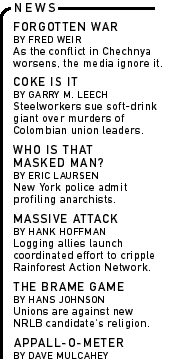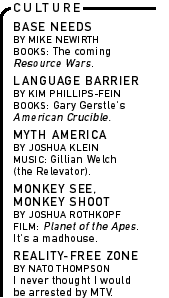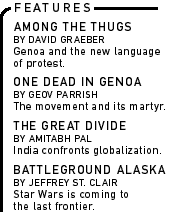|
|

|

|

|
|
|
| |
|
|
|
A lawsuit filed in a Miami federal court accuses the Coca-Cola Company, its Colombian subsidiary and business affiliates of collaborating with paramilitary death squads to threaten, kidnap and murder union leaders at its Colombian bottling plants. The lawsuit was filed on July 20 by the United Steelworkers of America and the Washington-based International Labor Rights Fund on behalf of Sinaltrainal, the union that represents Colombian Coca-Cola workers, the estate of murdered union leader Isidro Segundo Gil and five other unionists who worked for Coca-Cola and were targeted by paramilitaries. "We are filing this case to show our solidarity with the embattled trade unions of Colombia," says Steelworkers President Leo Gerard. Colombia has long been the most dangerous country in the world for union members
The plaintiffs are claiming U.S. jurisdiction under the Alien Tort Claims Act, which allows non-U.S. citizens to sue Americans for violations of international law. According to the complaint, Coca-Cola Colombia, as well as two Florida-based companies, Panamco and Bebidas y Alimentos, which bottle and distribute Coca-Cola products in Colombia, are legally required to abide by Coca-Cola's code of conduct regarding their operations and labor relations. Coca-Cola reserves the right to regulate environmental protections, impose standards concerning employee qualifications, and monitor treatment of employees. The plaintiffs are seeking an unspecified amount of compensation and an end to the human rights abuses. "Their code of conduct shows that they are legally responsible," says Terry Collingsworth of the International Labor Rights Fund, an attorney for the plaintiffs. "These companies come up with these codes and then don't enforce them." (Coca-Cola denies any wrongdoing.) Among the plaintiffs' evidence that Coca-Cola collaborated with paramilitaries is a 1996 incident in which Ariosto Milan Mosquera, plant manager at Bebidas y Alimentos' bottling facility in Carepa, publicly stated that he had ordered paramilitaries to quash the union. Union members claim that Mosquera often socialized with paramilitary fighters and even provided them with Coca-Cola products for their fiestas. Shortly after Mosquera's pronouncement, local members of Sinaltrainal began receiving threats from the paramilitaries. On September 27, 1996, Sinaltrainal sent a letter to the Colombian headquarters of both Bebidas y Alimentos and Coca-Cola Colombia informing them of Mosquera's threats against the union and requesting intervention on their behalf. On December 5, Bebidas y Alimentos employee and local Sinaltrainal executive board member Isidro Segundo Gil was killed by paramilitaries inside the Carepa bottling plant. The other union board members were also threatened with death if they did not leave town. Two days later, paramilitaries entered the plant and told employees they had three choices: resign from the union, leave Carepa, or be killed. According to eyewitnesses, the workers were then led into the manager's office to sign union resignation forms prepared by the company. Bebidas y Alimentos owner Richard Kirby, who is also a defendant in the case, says the company has no control over paramilitary activity and that the facts regarding the murder of Segundo Gil have been distorted. "You don't use them, they use you," he says. "Nobody tells the paramilitaries what to do. One day they showed up at the plant. They shut it down, put everyone against the wall and started shooting. Now it has been turned around so that it's our fault." The targeting of labor leaders is not limited to Carepa. In 1996, at Panamco's Bucaramanga bottling plant, local members of Sinaltrainal went on a five-day strike to protest the company's elimination of employee medical insurance. After the strike ended, according to the complaint, Panamco chief of security Jose Alejo Aponte, accused five members of the local Sinaltrainal executive board of planting a bomb in the plant. The five union leaders (three of whom are plaintiffs in the lawsuit) were imprisoned based on charges filed, according to official court documents, under the name of Coca-Cola, not Panamco. The union leaders were released six months later when the regional prosecutor declared the plaintiffs could not have planted the alleged bomb because it was never there. According to the plaintiffs, local management at Panamco's Barrancabermeja plant have sided openly with the paramilitaries in the civil war and publicly accused Sinaltrainal members of being guerrillas. Given the volatile situation in Barrancabermeja, home to the most intense urban warfare in Colombia, such an accusation is tantamount to a death sentence. The plaintiffs also are in the process of filing an injunction against Panamco calling for them to cease and desist from tampering with witnesses. Panamco, meanwhile, has issued a public statement denying the allegations contained in the lawsuit. According to Collingsworth, the company then presented the denial to its employees and ordered them to sign a blank piece of paper that could be used against them later. "There is no question that Coke knew about, and benefits from,
the systematic repression of unions at its bottling plants in Colombia,"
Collingsworth says. "This case will make the company accountable."
|






